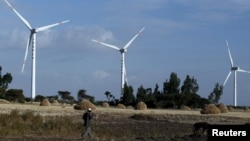U.S. officials say their government and China’s both want peace and development for African nations, and are working together on the continent. The statement marks a change in tone for the United States, which has suggested previously that China is exploiting Africa for its natural resources.
For years, the U.S. and China have played tug-of-war for influence in Africa. By most measures, China has come out on top, thanks in part to heavy investment across the continent and trade that topped $220 billion last year, three times greater than Africa's trade with the U.S.
But as both superpowers continue to ramp up their investment and diplomatic efforts, the two are happy to coexist, says Susan Thornton, U.S. Deputy Assistant Secretary of State for East Asian and Pacific Affairs.
She spoke to reporters this week about Chinese President Xi Jinping’s recent visit to the U.S. — which was overshadowed by the highly publicized U.S. tour by Pope Francis.
Aligned interests
“First of all, it seems obvious but it bears repeating, that the United States and Chinese interests in Africa are very much aligned. We both want to see economic development, and political stability and peace on the continent. We therefore welcome Chinese contributions to African peace and security, such as the deployment of peacekeepers in regions affected by strife, and Chinese involvement in, for example, counter-piracy efforts off the Horn of Africa."
She said the U.S. also welcomes China’s humanitarian contributions - such as its efforts to help combat the spread of Ebola in West Africa - and China's infrastructure projects, which she said promote a healthy investment climate.
Her words differ from those uttered by President Barack Obama, who seemed to single out China when he told African leaders during a July visit that “economic relationships can’t simply be about building countries’ infrastructure with foreign labor or extracting Africa’s natural resources.”
And Obama’s competitive view may also be how African nations see their two largest trade and diplomatic partners. South Africa, especially, seems to be toying with that balance by showing a growing alignment to the east — as seen by the nation’s decision to join the economic bloc known as BRICS — for Brazil, Russia, India, China, and South Africa.
No competition
During a September visit to China, South African President Jacob Zuma appeared to throw a jab at the U.S., saying, "As a major power‚ China has consistently used its strength for defending peace and security globally and not for aggression.”
Thornton, who spoke to African reporters by teleconference from Washington, said there is no competition and that the two nations are focused on the greater good.
“It is not about, by any means, a U.S.-China competition for domination or influence, she explained. "It is to benefit the people in that region and in that country, and help them face up to the challenges that are the most pressing challenges that they face, you know, at the time.”
Such a pleasant scenario would no doubt be a boon to all involved -- though these rosy images of a U.S.-China partnership in Africa seem at odds with rhetoric coming from presidents involved.





